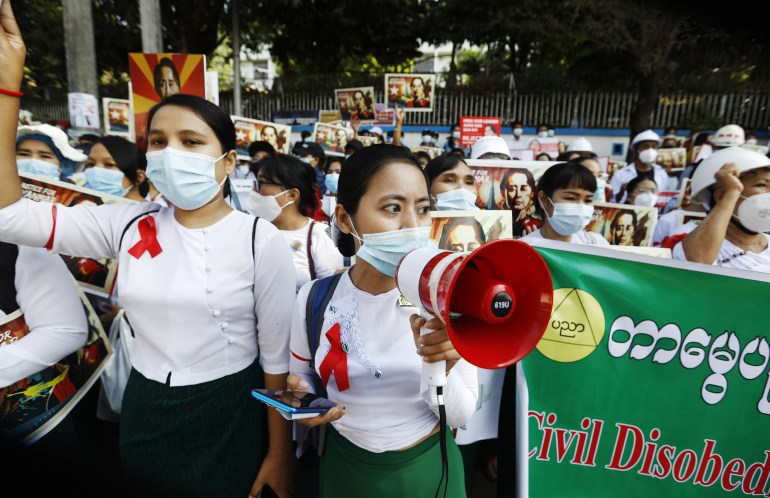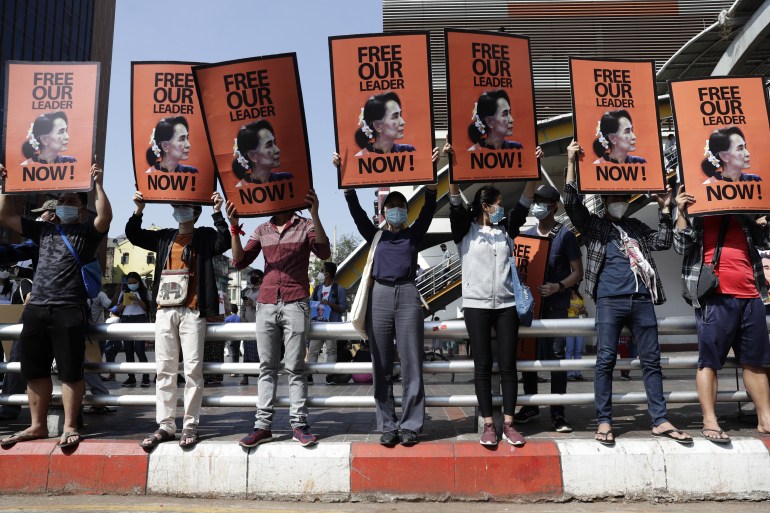Thousands of people took to the streets of Yangon on Wednesday to show their anger at the military coup in Myanmar amid rising concern of violence in the troubled Southeast Asian nation.
Protesters called for massive rallies to shatter the army’s claim that people backed its February 1 move to seize power from civilian leader Aung San Suu Kyi and her National League for Democracy (NLD) after they were returned to government in a landslide in November’s elections.
Along with the larger crowds, people also stopped their cars in the streets or at key junctions – their bonnets open in mass ‘breakdowns’ – as a way of thwarting any military advance.
Tom Andrews, the United Nations’ special rapporteur on human rights in Myanmar, said earlier he was “terrified” of an escalation in violence, saying he had received reports of troop movements around the country and feared the protesters were facing real danger.
“I fear that Wednesday has the potential for violence on a greater scale in Myanmar than we have seen since the illegal takeover of the government on February 1,” Andrews said in a statement.
“I am terrified that given the confluence of these two developments – planned mass protests and troops converging – we could be on the precipice of the military committing even greater crimes against the people of Myanmar.”

Internet networks were taken down for the third night in a row, but connectivity was restored on Wednesday morning, according to NetBlocks, which monitors disruption and outages, and images of the rallies widely shared.
Protesters included civil engineers, teachers and other government workers who gathered at key locations including the UN office, carrying banners calling for Aung San Suu Kyi to be freed and the military to leave.
People are saying their cars have collectively broke down near central bank. When asked by police, the owners say their cars appear to suffer from MAL-itis, a mysterious disease spreading through the nation since Feb 1. #CDM #CivilDisobedienceMovement #WhatsHappeninglnMyanmar pic.twitter.com/1F9R8X92xg
— Civil Disobedience Movement (@cvdom2021) February 17, 2021
Record breaking number of Yangon’s cars participating in the civil disobedience movement of blocking the roads claiming engine error, shortage of petrol etc. #WhatsHappeningInMyanmar #Feb17Coup pic.twitter.com/WLZYH7ah9u
— Hnin Zaw (@hninyadanazaw) February 17, 2021
Sidecars are breaking down too. What are the odds?#WhatsHappeningInMyanmar #CivilDisobedienceMovement pic.twitter.com/BK4z3KoVuQ
— Kim Jolliffe (@Kim_Jolliffe) February 17, 2021
Myanmar’s military has a history of violence and impunity during the decades that it ruled the country before the transition to democracy began 10 years ago.
Armed forces chief Min Aung Hlaing, who led the coup, also directed the 2017 crackdown on the Rohingya in the western state of Rakhine, which the United Nations has said was carried out with “genocidal intent“.
“The security forces’ approach could take an even darker turn fast,” the International Crisis Group warned in a briefing released on Wednesday.
“Soldiers and armoured vehicles have begun to reinforce the police lines and, should the generals become impatient with the status quo, could easily become the sharp end of a bloody crackdown, as has happened in the past.”
At a news conference on Tuesday, the generals claimed they had not staged a coup and their actions were necessary because of fraud in the November election.
Those claims have been rejected by the elections commission, whose officials are among hundreds of people the generals have detained since seizing power.


The military insisted they would hold new elections without saying when the polls might take place.
In 1990, the military refused to accept the result after the NLD, then a newly-formed party, swept the elections.
It had earlier used force against protesters in 1988, and did so again in 2007, when a hike in fuel prices triggered mass demonstrations led by Buddhist monks.
Aung San Suu Kyi is thought to be under house arrest and on Tuesday was charged under the National Disaster Management Law with breaching COVID-19 regulations while campaigning for the elections. She has also been charged with illegally importing walkie-talkies that were found in her home.
President Win Myint was also charged over pandemic breaches.
The Assistance Association for Political Prisoners, which is keeping track of those taken into custody, says 452 people have been detained since February 1. Some 417 remain in detention.

Credit: Source link